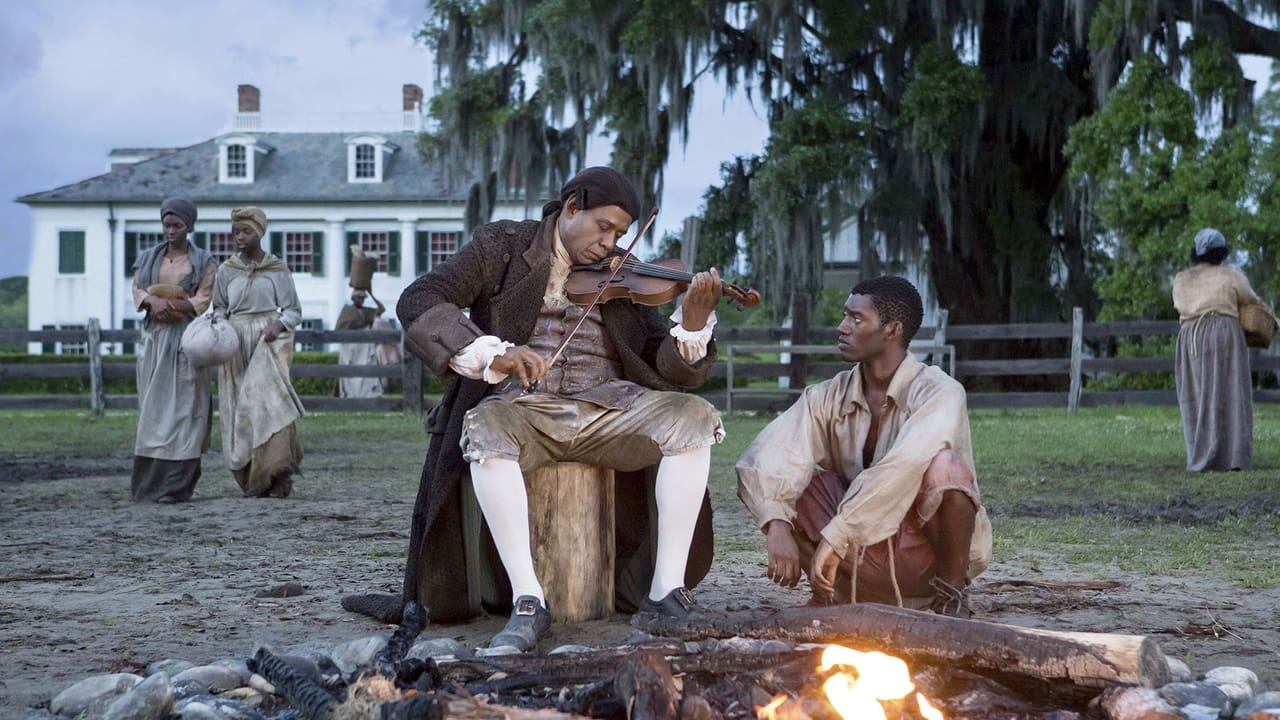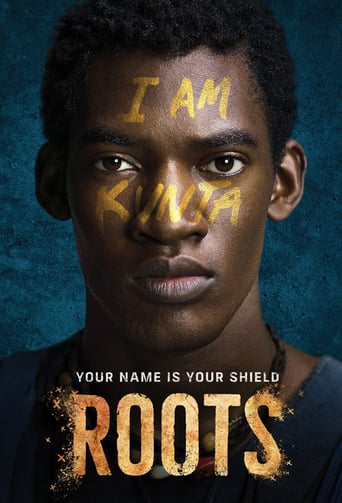vlatekk
I'm a 15 years french student and I apologize for my wrong english.
This film talks about a true story from slavaging, Roots takes place during 1750, and start in the river region of the Gambia. Two parents give birth to Kunta Kinte their son who's getting kidnapped in 1767 so as to be sold to british as a slave.
Some scenes show the treatment reserved to slaves wich are a bit bloody.
There was also a scene that leaved me disgusted because Kunta Kinte will try to escape from his owner and something unexpected happens then it influences on the end.
Some points are also positive, there is a lot of action wich make it more dynamic and attractive, a plus is that actors are doing their role well, that's full of live.As a conclusion I would say this film is great for everyone above 12 years old because of some violent scene.
iloepatouillat
Hello,
my name is iloë, i am 16 years old. I am in second at the high school chevrollier. I saw this movie within the framework of court of English about the slavery. At first I did not like too much the subject but in finaly I was interested in it.
"Roots" is a movie realised in 2016 by 'history' . directors is Will Packer and Marc Toberoff. It tells the story of kunta. kunta a young man living in Mandinka with his parents and uncle Silla surrounded by all the tribe is capture to be sold and served as a slave. We see each step of his journey until its depletion. The film is interesting because it shows the reality of the facts with all the violence. The story is very beautiful, we feel the emotions of Kunta, including his love for his father, his mother and Jinna the girl he loves. The actors are very talented. unfortunately i was disappointed since i hate movies that end badly and the end is really sad because Kunta is to finish and do not want to fight anymore for his convictions. We do not know if he is going to die or live because he closes eyes.
gmoney65
I see some have slammed this remake of Roots, let's understand one thing I was a teen at the time of the original Roots if they had made this truthful version back in the day, people would have rioted in the streets. I respect the accuracy of this version, besides Haley was sued for plagiarism to the original story.
catesa
When I heard in 2013 that The History Channel (sorry, I forgot, it's just called "History" now) was going to remake "Roots", I was mostly just confused. Considering it wasn't even 40 years since the original, I thought "Is this really necessary?" The '77 miniseries is one of the most important cultural events of the 20th century. It seemed kind of blasphemous to do a remake, especially so soon. Why don't we re-cast and re-shoot "Star Wars" while we're at it? Yeah, it IS that stupid an idea. However, I also understand that a lot of Americans' entire understanding of slavery is based on having watched the miniseries, and some of the history in the original is certainly flawed. I was skeptical that a new one would be anywhere near as good, but I was drawn in with promises that it would be "truer to the book," and include "new information discovered since the original," etc. And frankly, in a day in age where BLM protesters are referred to as "thugs" by subconscious racists, and Barack Obama is somehow viewed by a lot of white people as more "divisive" than his successor (go figure), I think as many (particularly white) people as possible need to be reminded where all these racial problems came from. So sure! Let's give it a whirl! To me this new version only outshines the original in a couple instances: The updates to Juffure and the portrayal of Mandinkan culture/clothes/housing is really cool to see. The inclusion of the internal West African slave trade is also really important. We know now that having Kunta and co. running around in loincloths in the woods and white men strolling through the jungle kidnapping people at random is just plain inaccurate. On the other hand, the original tale Alex Haley heard was that Kunta was out chopping wood to make a drum when he was taken - kinda weird that this was entirely omitted, but I suppose I can let that go if it means seeing a more accurate Juffure. The other thing I appreciated was the removal of all those goofy sympathetic white characters. Anyone who knows the story behind the original miniseries knows those characters were created because ABC thought white people wouldn't tune in if there weren't some nice white guys sprinkled in to make them feel better. As someone whose ancestors owned slaves, I don't think that's what white audiences (especially in the south) need to see. We already have too many white people going on about how slavery's evils were exaggerated, or "most people didn't own slaves," or "most slaves weren't treated that badly," etc. I think it's more important to drive home the overwhelming racism, violence, and brutality that permeated every part of southern society (again, so as to better understand how deep-seated racism against African Americans is in our culture). Aside from these two updates, the new version (particularly after Kunta arrives in Virginia) doesn't really improve on the original, nor is it accurate to the times. No doubt there were dignified, proud, sly slaves who could find ways around or out of the system (as Kunta's descendants do in the original), but let's be honest: to have Kunta killing his overseer and not immediately having his head cut off is ridiculous. Any kind of violent resistance to a white person would have been met with totally gratuitous cruelty on the part of the slave-owners. For most slaves there was little to no relief from the constant terror, violence, and depression that loomed day in and day out over the plantation. That's really what makes the history of slavery so heart breaking. There was very little mercy on the part of slave owners as they tormented their "property" throughout their lives. I can understand that it might provide some catharsis for the audience to have Kizzy hold a knife to Tom Lea's throat, or to have Chicken George just shoot Murray's son and walk away like nothing happened, but it's also a false narrative that allows white people today to feel better about their ancestors' cruelty (as if revenge was an option for slaves). It also downplays the real perseverance and strength black people of the time had to have considering there really were no opportunities for them to settle the score unless they were prepared for certain death (granted, many were, and didn't survive their attempts at revolt, but that's my point - they didn't just walk off into the sunset).To make a long story short, the new series is definitely more accurate when it comes to the Africa scenes. Once Kunta's in America, the original miniseries was probably far more accurate - not in terms of violence (there was a lot that couldn't get past the censors in 1977), but in terms of the slaves' attitudes and actions. We see fiddler with his backhanded compliments, Kizzy spitting into Missy Ann's water, Tom and the family setting a trap for Evan Brent; they get away with as much as they can without the master noticing, and that was fairly typical. Also, as to be expected with something put out by The History Channel (Sorry - History), there's a bunch of time spent on unnecessarily working in historical events that could've been spent on the characters and the inner-workings of slavery. Having Kunta join the Ethiopian Regiment, or Chicken George at Ft. Pillow? Totally lame, and not important to the story at all. I could go on, but I won't. Check it out if you're a black history buff, but it doesn't hold a candle to the original for me.

